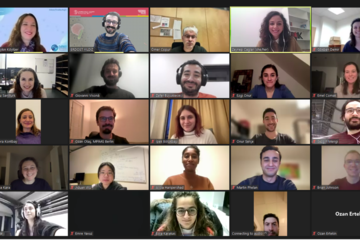Digital Annual Meeting of the Max Planck Society 2021
As in the previous year, this year’s Annual Meeting of the Max Planck Society and its members and committees will be held as an online event. The highlights of the event: The Nobel Laureate in Chemistry, Emmanuelle Charpentier, and the Nobel Laureate in Physics, Reinhard Genzel, will present their work at the Plenary Assembly, in conversation with Mai Thi Nguyen-Kim and Harald Lesch. German Chancellor Angela Merkel will be honoured with the Harnack Medal.

Although the meeting will take place digitally again due to the coronavirus pandemic, special glamour will be added by the Nobel Prize winners Reinhard Genzel and Emmanuelle Charpentier. In the digital Plenary Assembly, they will be presenting their Nobel Prize-winning research. Genzel will talk to television journalist Harald Lesch, who is also an astrophysicist, while Charpentier will be in dialogue with YouTuber and chemist Mai Thi Ngyuen Kim. The Max Planck Society will publish the videos the two interviews about black holes and genetic scissors on its YouTube channel after the meeting.
From the Senate
The main topic of this year's Senate meeting during the Annual Meeting will be the Max Planck Schools – a joint doctoral programme of currently 23 universities and more than 30 institutes of non-university research institutions. This unique network gives doctoral students in the research fields of Cognition, Matter to Life and Photonics early access to a versatile and first-class research infrastructure, innovative teaching formats and renowned researchers as early as after their Bachelor's degree. The Federal Ministry of Education and Research is funding the pilot phase with 45 million euros over five years. During the Senate meeting, the results of the first interim evaluation will be presented, which was carried out by a four-member evaluation panel under the leadership of the former Chair of the Science Council and Chairman of the Board of Charité Universitätsmedizin Berlin, Prof. Karl Max Einhäupl, from December 2020 to April 2021.
Presentation of the Harnack Medal
The highlight of this year's Annual Meeting will be the awarding of the Harnack Medal to German Chancellor Angela Merkel. The Harnack Medal is the highest distinction of the Max Planck Society and its predecessor institution, the Kaiser Wilhelm Society. It has been awarded exactly 33 times since 1924. In addition to special scientific personalities, numerous industrialists have also been honoured with the Harnack Medal. And last but not least, three former Federal Presidents, Theodor Heuss (1959), Heinrich Lübcke (1964) and Richard von Weizsäcker (1990), have also received this award.
Awards for talented young researchers
While the Chancellor will receive the prestigious award in person at a small-circle ceremony at the Humboldt Carré in Berlin, the Otto Hahn Medal for early career researchers will be presented during the digital Section meetings. The award is given for outstanding scientific achievements in connection with the doctoral thesis. The young talents introduce themselves to the directors of their respective sections during the video conference. Those who would also like to get an idea of the award winners can find a detailed presentation of the individuals and their research work here.
Annual Report and Highlights from Yearbook 2020
The current Annual Report will also be adopted during the Annual Meeting. Together with the Annual Report 2020, the Max Planck Society also publishes a scientific activity report in the form of the Yearbook. The Yearbook contributions of all Max Planck Institutes are made available on the Internet at www.mpg.de/jahrbuecher. 15 contributions of particular interest from the point of view of science communication were selected as highlights and edited once again for journalistic purposes.
Researchers from the MPI for the Study of Societies explain why it is important to develop social and economic policy plans for the future in order to overcome the current crisis. Whether politics can strengthen confidence in the future is also determined by rhetorical persuasiveness. At the MPI for Software Systems, a research group is developing artificial intelligence (AI)-based virtual tutorial systems that help students learn programming according to their individual abilities. And at the MPI for Molecular Physiology, tumour cells are put on a radical sugar diet with inhibitors. Because cancer cells are addicted to sugar - they need ten times more sugar than normal cells. The identified substances are being further developed at the Lead Discovery Centre to create lead molecules for medicine and, if successful, could one day be used for cancer therapies.












